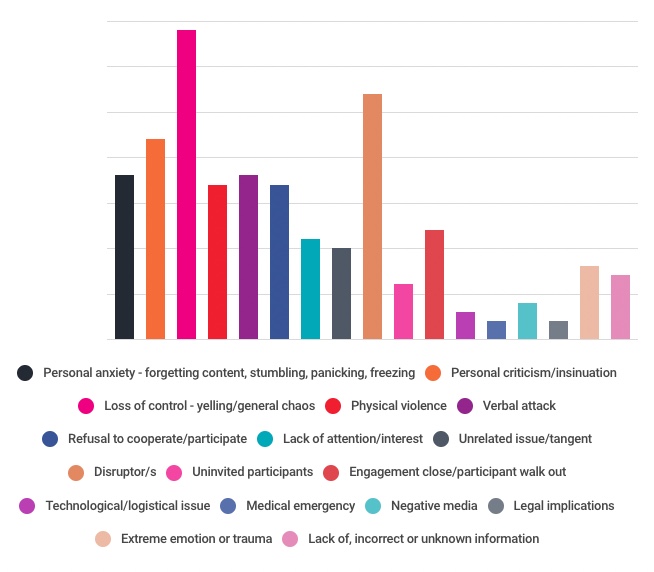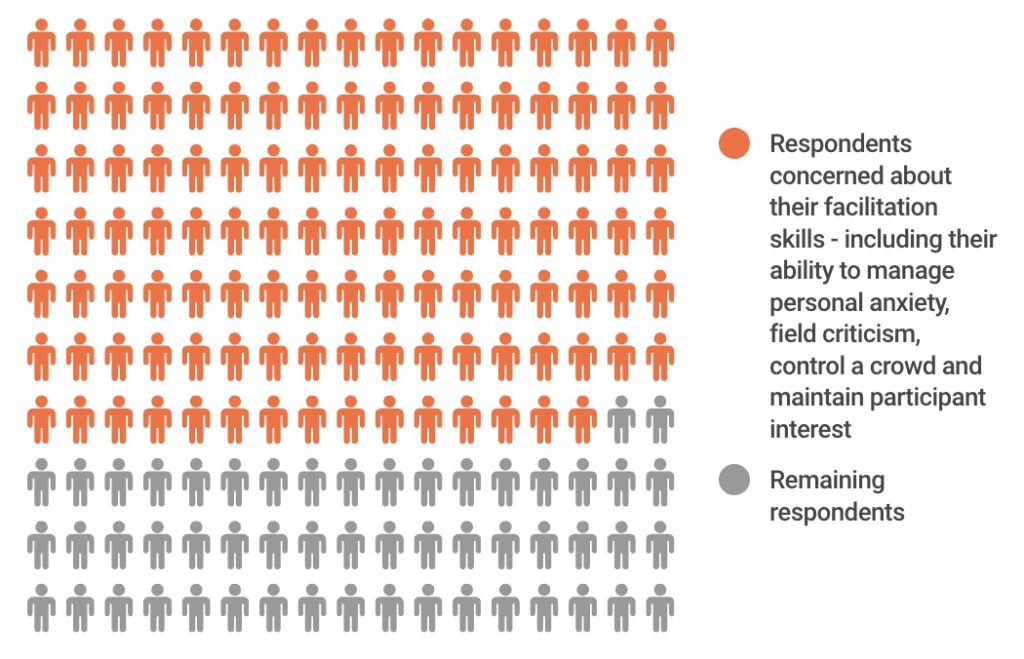At the start of each of our advanced facilitation training sessions, we ask participants a crucial question – “what is your worst facilitation fear?” For many people, the idea of facilitating a large group discussion (or public speaking in general) sounds pretty terrifying – but to us, it’s our bread and butter. And we’re constantly trying to evolve and improve.
As community practitioners and engagement experts, we relish in the opportunity to guide disjointed groups towards a positive collective outcome. If a project is contentious, we want to alleviate people’s fears and provide assurance to community groups that they have been considered, seen and heard. If a project inflicts or unearths trauma within communities, we want to provide resources for assistance and opportunities to mitigate negative impacts.
Facilitators are often idealists. In perfect world, what is complex can be demystified and what is broken can be fixed, with help of three dedicated hours and a whiteboard. Of course, the reality is much more elaborate. When we engage on controversial projects, attendees are often confused, disengaged, angry or emotional (or all at once).
Asking facilitators about their worst fears tends not to unveil destructive and devastating crises. Instead, people tell us about what they’ve seen glimmers of in their practice so far, and what they realistically know can happen in our line of work.
We’ve analysed the answers of over 100 engagement practitioners from Australia and New Zealand, performing a sentiment analysis of responses from late 2022.
This is what we found:
According to theme, facilitators most frequently cite the following fears:
- Losing control – witnessing a facilitation session dissolve into chaos and noise
- Being derailed by a disruptor or disruptor/s
- Being personally criticised or undermined
- Fielding verbal attacks – either personally, or between participants
- Succumbing to personal anxiety – forgetting content, stumbling on words, freezing or panicking.

The fear of losing control of a session or being derailed by a disruptor speaks to the effort that goes into preparing a facilitation session. There are hundreds of facilitation techniques, activities and methods, and often, sessions have been carefully and deliberately crafted to help audiences achieve specific objectives.
As with most things, preparation is key to successful engagement.
We design and plan our sessions to allow ample time for community members to share feedback and engage in discussions. Often, participants are invited to connect with official channels post-event to share further feedback and our teams work to ensure that feedback and communication loops are open far beyond the original engagement date.
When a session dissolves into yelling or falls to the whim of a particularly angry minority, our planned agendas are often abandoned and with them, our hopes of reaching positive outcomes.

Interesting, near equal numbers of respondents are concerned about physical and verbal abuse. While we tend to catastrophise about violence when considering worst-case scenarios, many participants indicated that personal verbal attacks against themselves or other participants also sits high on their list of fears.
As facilitators trained to engage with marginalised communities or people who have experienced trauma, we recognise the devastating impact that emotional abuse, bullying and hate speech can have on individuals and their mental wellbeing.
At the crux of our findings was a distinctly human revelation – we don’t like people getting hurt, physically or emotionally, and that includes ourselves.
Two-fifths of the top five concerns shared by respondents related to their individual facilitation skills, both feeling criticised during or post-facilitation, or falling victim to personal anxiety on the day, often causing them to lose control of the session.
Of 124 responses, 84 people expressed concern about their ability to facilitate, including their skill at managing personal anxiety (including forgetting content, stumbling or freezing), fielding criticism, controlling an emotional or angry crowd and maintaining participant interest.

These findings demonstrate that despite appreciating the opportunity to take control of a crowd, facilitators hope to do so in a way that reflects their depth of skill and ability to artfully guide people towards a desirable outcome.
Many facilitators practice presenting with polish and in a way that captivates audiences – specifically to prevent their ‘worst fear’ scenarios from coming true.
How can we help?
Luckily, there are tactics that can be used to de-escalate contentious arguments and re-direct audience concerns that reach beyond the scope of an engagement session.
Expert facilitators should be armed with psychological tools and practical activities aimed at keeping people safe, calm and engaged.
If you would like to learn more about how you can be a better facilitator and arm yourself against disruption during engagement, we would love to train you.
Join the many facilitators included in this data set, who started the day being asked “what is your worst facilitation fear?’” and walked out feeling confident enough to face them!
Register here to participate in the ‘IAP2 Certificate of Engagement’ with the Articulous Academy.
Register here to participate in our bespoke course ‘Facilitating the Tough Stuff’.
Or, see our complete list of courses on offer through the Articulous Academy!






